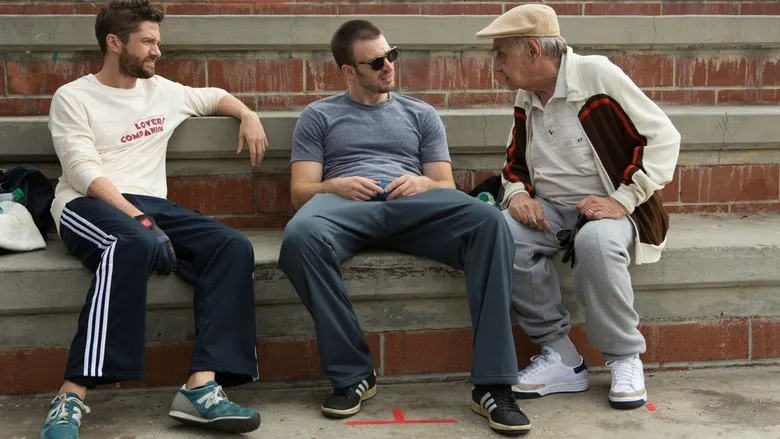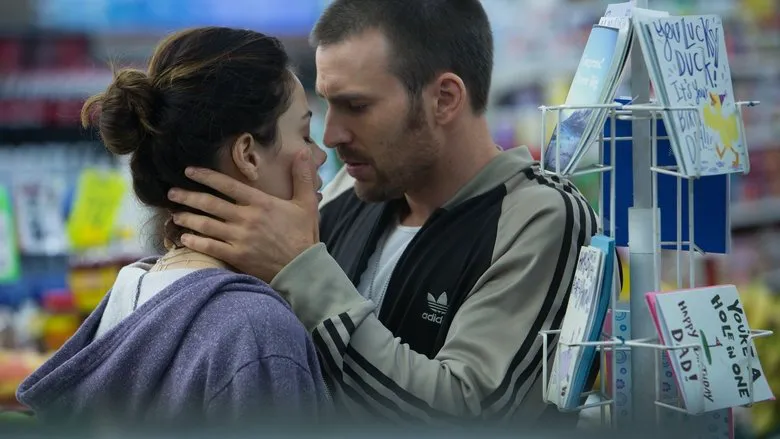A Double Feature: Revisiting Memorable Performances by Michelle Monaghan and Grażyna Szapołowska
This exploration delves into the impactful contributions of two distinguished actresses: Michelle Monaghan, bringing her vivacious energy to the romantic comedy “Playing It Cool,” and Grażyna Szapołowska, delivering a profound performance in the contemplative Polish drama “No End.” Both films offer unique cinematic experiences, anchored by the compelling presence of their leading ladies.
Michelle Monaghan’s Charms in “Playing It Cool” (2014)
Step into the delightful, often quirky, world of romantic comedies with a deep dive into Michelle Monaghan’s engaging portrayal in the 2014 film, “Playing It Cool.”
Unveiling Michelle Monaghan
Michelle Monaghan, an acclaimed American actress, hails from the heartland of Winthrop, Iowa, where she experienced a grounded upbringing. Her formative years were shaped by her father’s work in a factory and her mother’s dedication to running a daycare center. Initiating her academic journey, she pursued journalism for three years at Columbia College Chicago, a period during which her striking looks and presence simultaneously launched her into the world of modeling. Post-graduation, she made the decisive move to New York City to fully embrace her burgeoning modeling career.

Monaghan’s transition into acting began in 2000 with a role in “Perfume,” quickly showcasing her potential. By 2005, she secured a significant leading role opposite the formidable Robert Downey Jr., marking a pivotal moment in her ascendance. Her career trajectory gained substantial momentum in 2008 with her dynamic appearance in the thriller “Eagle Eye,” further cementing her reputation as a versatile talent. Her esteemed work continued to impress, culminating in a Golden Globe nomination in 2015 for her compelling performance in the television series “True Detective.” With an impressive filmography boasting 58 film and television credits, Monaghan continues to grace the screen, with anticipation building for her upcoming movie, “MaXXXine,” slated for release this year.
“Playing It Cool” (2014): A Whimsical Synopsis
“Playing It Cool” navigates the often humorous yet poignant journey of a screenwriter plagued by a severe case of writer’s block. His creative stagnation stems from a profoundly jaded perspective on love, rooted in a childhood abandonment that scarred his views on intimacy and commitment. Consequently, he unwittingly sabotages every potential relationship that comes his way. Desperate to complete his overdue script, he seeks counsel and inspiration from his circle of eccentric friends, yet their advice proves insufficient. Then, a chance encounter introduces him to a truly captivating woman who, despite his cynicism, manages to steal his cynical heart almost instantly. The significant complication? She’s engaged to another man. However, a surprising twist allows him to navigate this tricky situation by becoming her platonic friend, setting the stage for a delightful exploration of love’s unpredictable nature.

A Refreshing Spin on the Rom-Com Genre
While the narrative arc of “Playing It Cool” may culminate in a somewhat predictable resolution, faithfully adhering to the beloved, time-honored romantic comedy formula, the film skillfully sidesteps many of the genre’s more tired clichés. One of the film’s most refreshing attributes is its unique narrative viewpoint: it is distinctively a romantic comedy told from a male perspective, offering a fresh lens through which to explore the complexities of modern romance. In an unusual and engaging twist, the film deliberately withholds the names of its main characters, building suspense and a playful intimacy until their eventual reveal in the captivatingly satisfying final act.
Electrifying Performances and Undeniable Chemistry
Chris Evans shines remarkably as the film’s narrator, embodying the persona of a dashing screenwriter and charming ladies’ man — a refreshing departure and stark contrast to his globally iconic role as Captain America. Evans flawlessly transitions between uproarious comedic moments and deeply emotional scenes, infusing the character with genuine humanity. His witty and insightful narration truly serves as the heart and soul of the entire film, guiding the audience through its quirky narrative. Michelle Monaghan is equally remarkable, delivering a balanced and deeply engaging performance. The interaction and chemistry between Evans and Monaghan feel wonderfully natural and genuinely exciting, drawing viewers deeper into their unconventional courtship.

Evans radiates effortless charm, effortlessly carrying the film and showcasing an array of stylish outfits that enhance his character’s appeal. The budding affection and genuine love between the characters, beautifully portrayed by Evans and Monaghan, unfolds with a believable and heartwarming gradualness throughout the film. Despite operating within a broadly predictable romantic comedy framework, their performances infuse innovation into the story’s development, making each discovery feel fresh and compelling. Overall, “Playing It Cool” stands as an undeniably enjoyable and truly romantic cinematic experience.
Concluding Reflections
Through its inventive use of narration, the story of “Playing It Cool” unravels in a uniquely captivating manner, maintaining audience interest and engagement right up to its charming conclusion. The film masterfully strikes a perfect balance between witty humor and tender romance, making it an unquestionably worthwhile watch for anyone seeking a fresh and endearing romantic comedy.
Grażyna Szapołowska’s Profound Presence in “No End” (1985)
Now, let us journey into the introspective world of Polish cinema, casting a deserved spotlight on Grażyna Szapołowska and her deeply impactful role in Krzysztof Kieślowski’s 1985 masterpiece, “No End.”
Discovering Grażyna Szapołowska
Grażyna Szapołowska, a celebrated Polish actress, was born in the historic city of Bydgoszcz. Her formidable artistic foundation was forged at the prestigious Warsaw National Academy of Dramatic Art, where she honed her craft. From 1977 to 1984, she was a distinguished member of the ensemble at the renowned Warsaw National Theatre, gracing countless stage productions with her powerful presence. Concurrently with her extensive theatrical work, she progressively embarked upon her compelling career in film.

Szapołowska made her compelling film debut in 1978 with “Zapach ziemi” (The Scent of the Earth), laying the groundwork for her cinematic journey. By 1980, she secured a significant leading role in “Życie na Serio” (Life Seriously), further solidifying her status. However, her career reached unprecedented heights in 1988 with her unforgettable starring role in Kieślowski’s “Krótki film o miłości” (A Short Film About Love), a performance that not only earned her widespread critical acclaim but definitively cemented her reputation as one of Poland’s most compelling screen talents. With an impressive ledger of 83 film and television credits, she continues to act, captivating audiences with her enduring talent, as evidenced by her role in the 2022 film “Wszyscy śpiewają” (Everyone Sings).
“No End” (1985): A Somber Reflection
“No End” weaves a poignant and thought-provoking narrative around the sudden death of a lawyer deeply involved in defending arrested union members during the turbulent period of martial law in Poland. His unexpected demise leaves the intricate and politically charged case in limbo. An older, more experienced lawyer reluctantly steps in to take over, becoming embroiled in fraught legal and moral debates surrounding the defense. Under immense pressure and the pervasive sense of a doomed struggle, the union member ultimately makes the difficult decision to abandon the case.

Meanwhile, the deceased lawyer’s wife, consumed by an abyss of emptiness and profound spiritual loneliness in the wake of her husband’s death, desperately seeks solace. She engages in a series of affairs, but the fleeting material and physical satisfaction she finds cannot begin to fill the vast void left by her spiritual desolation. In a poignant and agonizing act of despair, confronted by the seemingly “no end” to her suffering and the political hopelessness of the time, she ultimately chooses to take her own life, bringing a tragic, yet deeply resonant, conclusion to her struggle.
A Performance of Raw Power
Grażyna Szapołowska’s portrayal of the grieving widow, wrestling with unbearable loss and a profound sense of abandonment, is nothing short of captivating. She imbues the character with a quiet yet formidable strength, making her agony palpable and impossible for the audience to turn away from. Her compelling performance elevates the film, contributing significantly to its thematic depth. “No End” itself holds considerable influence within the landscape of what would become the mainstream cinema of its era, marking a crucial moment in Krzysztof Kieślowski’s developing filmography.
Kieślowski, with his characteristic unflinching honesty, courageously tells this deeply human story, offering brilliant and often unsettling insights into the human condition under duress. The film masterfully explores the immense pain and enduring suffering that can permeate the very core of one’s being in the aftermath of such profound heartbreak and loss, set against a backdrop of societal disillusionment.
Moments of Poignant Brilliance
The cinematic experience of “No End” is punctuated by numerous moments of profound artistic brilliance, often executed with a fearless commitment to stark reality. Kieślowski, true to his unparalleled directorial style, consistently discovers subtle yet potent ways to illuminate his complex themes, drawing audiences into the psychological and emotional landscapes of his characters with remarkable precision and empathy. Each frame seems carefully crafted to evoke a particular feeling or question, making the film a rich tapestry of human experience.

Final Thoughts on a Masterpiece
“No End” stands as a truly great film conceived by a truly great director, firmly grounded in the tumultuous political and social realities of its historical period. If you are seeking a deeply realistic, profoundly thought-provoking, and emotionally resonant cinematic experience that challenges and rewards, this powerful Polish drama is unequivocally a must-see.